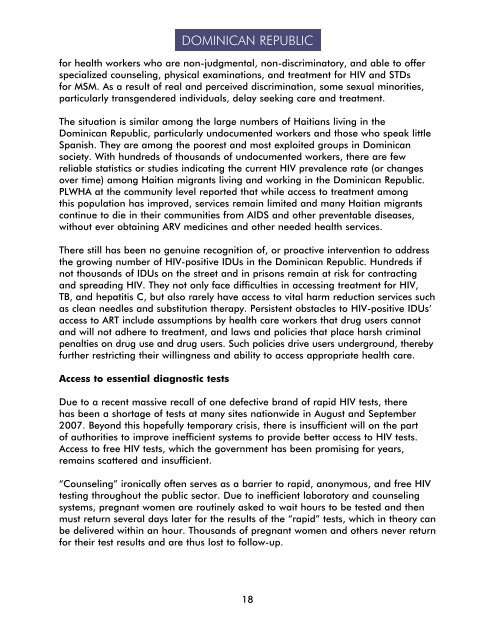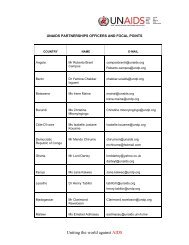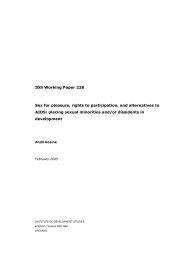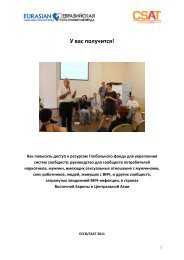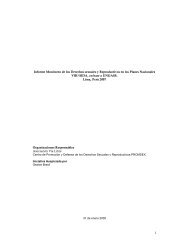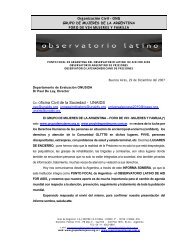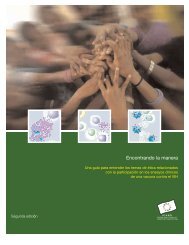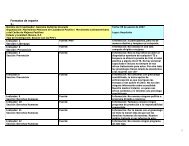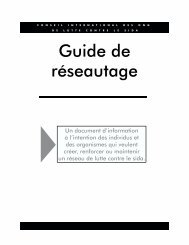DOMINICAN REPUBLICto access rapid tests and receive ARVs—yet thousands of pregnant women at <strong>the</strong>same site must wait several days for <strong>the</strong>ir test results. Although <strong>the</strong>ir children canget care in <strong>the</strong> public hospital in Los Mina, HIV-positive parents are forced to obtain<strong>the</strong>ir own medicines from separate sites in o<strong>the</strong>r parts <strong>the</strong> city. This is a majorinconvenience for patients and families and highly inefficient from a comprehensivepublic health perspective.A similar dichotomy exists in Boca Chica, where extensive services are now beingoffered to a small number of people by <strong>the</strong> Clinton Foundation at private Catholichealth clinics, standing in sharp contrast to <strong>the</strong> limited services available to a muchlarger number of patients, who are mostly poor, at <strong>the</strong> nearby municipal publichospital. Improved coordination between <strong>the</strong> new pediatric and adult treatmentsites sponsored by <strong>the</strong> Clinton Foundation and o<strong>the</strong>r NGOs is needed to betterintegrate <strong>the</strong>se services with public hospitals, which is where <strong>the</strong> majority ofpregnant women seek antenatal care, and where most Dominicans end up when<strong>the</strong>y are sick.<strong>Access</strong> to treatment among vulnerable groupsTheoretically, HIV/<strong>AIDS</strong> treatment and care is available to anyone who needs it in<strong>the</strong> Dominican Republic. In practice however, for many individuals, for a variety ofreasons, accessing care and receiving medicines remains difficult if not impossible.This is particularly true among prisoners, men who have sex with men (MSM),injecting drug users (IDUs), Haitian migrants, people living in rural areas, and <strong>the</strong>poor, who remain among <strong>the</strong> least likely to have access to ART and o<strong>the</strong>r vital HIVprevention and care services.Little if any progress has been made in extending ART access to HIV-positivepeople in prisons in <strong>the</strong> Dominican Republic. According to data provided by <strong>the</strong>National <strong>AIDS</strong> Program, only one of seventy inmates identified as HIV-positive wasreceiving ART in two large jails covered by <strong>the</strong> Global Fund and <strong>the</strong> National HIV/<strong>AIDS</strong> Treatment Program. It is unclear how many of those identified, or how manyprisoners nationwide in o<strong>the</strong>r jails also need treatment, but <strong>the</strong> number is likelygreater than one. For example, provincial health workers reported <strong>the</strong>y were unableto obtain assistance to provide support for HIV-positive inmates needing treatmentin one of <strong>the</strong> many jails where no official treatment program exists. This indicatedthat while in some cases <strong>the</strong>re is capacity and leadership on <strong>the</strong> ground to helpbring counseling, testing, and ART to prisoners needing <strong>the</strong>se services, authoritieshave yet to coordinate, prioritize, and finance such efforts.Staff at Amigos Siempre Amigos, an NGO that has long engaged in advocacy,prevention, and defense of human rights of sexual minorities in <strong>the</strong> DominicanRepublic, noted that despite some improvements, it remains difficult to obtainappropriate support in many treatment sites. They noted that <strong>the</strong>re is still a need17
for health workers who are non-judgmental, non-discriminatory, and able to offerspecialized counseling, physical examinations, and treatment for HIV and STDsfor MSM. As a result of real and perceived discrimination, some sexual minorities,particularly transgendered individuals, delay seeking care and treatment.The situation is similar among <strong>the</strong> large numbers of Haitians living in <strong>the</strong>Dominican Republic, particularly undocumented workers and those who speak littleSpanish. They are among <strong>the</strong> poorest and most exploited groups in Dominicansociety. With hundreds of thousands of undocumented workers, <strong>the</strong>re are fewreliable statistics or studies indicating <strong>the</strong> current HIV prevalence rate (or changesover time) among Haitian migrants living and working in <strong>the</strong> Dominican Republic.PLWHA at <strong>the</strong> community level reported that while access to treatment amongthis population has improved, services remain limited and many Haitian migrantscontinue to die in <strong>the</strong>ir communities from <strong>AIDS</strong> and o<strong>the</strong>r preventable diseases,without ever obtaining ARV medicines and o<strong>the</strong>r needed health services.There still has been no genuine recognition of, or proactive intervention to address<strong>the</strong> growing number of HIV-positive IDUs in <strong>the</strong> Dominican Republic. Hundreds ifnot thousands of IDUs on <strong>the</strong> street and in prisons remain at risk for contractingand spreading HIV. They not only face difficulties in accessing treatment for HIV,TB, and hepatitis C, but also rarely have access to vital harm reduction services suchas clean needles and substitution <strong>the</strong>rapy. Persistent obstacles to HIV-positive IDUs’access to ART include assumptions by health care workers that drug users cannotand will not adhere to treatment, and laws and policies that place harsh criminalpenalties on drug use and drug users. Such policies drive users underground, <strong>the</strong>rebyfur<strong>the</strong>r restricting <strong>the</strong>ir willingness and ability to access appropriate health care.<strong>Access</strong> to essential diagnostic testsDOMINICAN REPUBLICDue to a recent massive recall of one defective brand of rapid HIV tests, <strong>the</strong>rehas been a shortage of tests at many sites nationwide in August and September2007. Beyond this hopefully temporary crisis, <strong>the</strong>re is insufficient will on <strong>the</strong> partof authorities to improve inefficient systems to provide better access to HIV tests.<strong>Access</strong> to free HIV tests, which <strong>the</strong> government has been promising for years,remains scattered and insufficient.“Counseling” ironically often serves as a barrier to rapid, anonymous, and free HIVtesting throughout <strong>the</strong> public sector. Due to inefficient laboratory and counselingsystems, pregnant women are routinely asked to wait hours to be tested and <strong>the</strong>nmust return several days later for <strong>the</strong> results of <strong>the</strong> “rapid” tests, which in <strong>the</strong>ory canbe delivered within an hour. Thousands of pregnant women and o<strong>the</strong>rs never returnfor <strong>the</strong>ir test results and are thus lost to follow-up.18
- Page 1 and 2: Missing the Target #5:Improving AID
- Page 4 and 5: ArgentinaDr. María Lorena Di Giano
- Page 8 and 9: Executive SummaryAt the G8 meeting
- Page 12: • UN agencies should provide incr
- Page 16 and 17: Price should not be a barrier when
- Page 18 and 19: The Global Fund and UNITAID: The Fu
- Page 20 and 21: The real cost of free treatmentBy a
- Page 22 and 23: Remaining work for asuccessful prog
- Page 26 and 27: DOMINICAN REPUBLICIn Santo Domingo
- Page 28 and 29: ZIMBABWEtreatment, representing 35
- Page 30 and 31: ZIMBABWEAccording to the Medicines
- Page 32 and 33: ZIMBABWEZimbabwe’s application fo
- Page 34 and 35: ZIMBABWENational government• Addr
- Page 36 and 37: RUSSIAMigrantsRussia, with the seco
- Page 38 and 39: a person with HIV will die very qui
- Page 40 and 41: FamiliesIn Kenya, families are the
- Page 42 and 43: INDIA2. Provide pediatric formulati
- Page 44 and 45: Linking nutrition and treatmentBy W
- Page 46 and 47: Most people living with advanced HI
- Page 48 and 49: only available in the capital, Yaou
- Page 50 and 51: ZAMBIAFindings in particular provin
- Page 52 and 53: The DACA for Chadiza District was a
- Page 54 and 55: Many health care workers are inadeq
- Page 56 and 57: DRUG REGISTRATION BARRIERS & LOGJAM
- Page 58 and 59: Country ATV RLPV/rLPV/r(HS)TDFArgen
- Page 60 and 61: development and registration. Likew
- Page 62 and 63: Capacity issues and delays in the W
- Page 64 and 65: Lack of post-approval quality assur
- Page 66 and 67: ARV PROCUREMENT, REGISTRATION,AND S
- Page 68 and 69: ARGENTINAParallel importingRelating
- Page 70 and 71: ARGENTINAAccess to ARVsNo difficult
- Page 72 and 73: Viral load tests are available, but
- Page 74 and 75:
Cambodiaby Mony PenOnly pharmacists
- Page 76 and 77:
ChinaBy anonymous Missing the Targe
- Page 78 and 79:
CHINAThe current process for regist
- Page 80 and 81:
Dominican RepublicBy Eugene Schiff
- Page 82 and 83:
IndiaBy Abraham KK, Celina D’Cost
- Page 84 and 85:
MalawiBy Lot Nyirenda and Grace Bon
- Page 86 and 87:
MALAWIStock-outsAccording to an ext
- Page 88 and 89:
MoroccoBy Othman MelloukMorocco has
- Page 90 and 91:
Determine the patent status of all
- Page 92 and 93:
MOROCCOThe shortage occurred becaus
- Page 94 and 95:
As of November 2007, the unit cost
- Page 96 and 97:
NIGERIADiagnostic testsDiagnostic t
- Page 98 and 99:
The government’s initial inabilit
- Page 100 and 101:
Increase training and capacity buil
- Page 102 and 103:
treatment practice. The Minster ann
- Page 104 and 105:
Ugandaby Richard Hasunira, Prima Ka
- Page 106 and 107:
UGANDAExtracts from the MoH’s rep
- Page 108 and 109:
ZAMBIAIn gathering this information
- Page 110 and 111:
However, since manufacturing prices
- Page 112 and 113:
105SHORT SUMMARY
- Page 114:
PAKISTANAccess for marginalized gro


